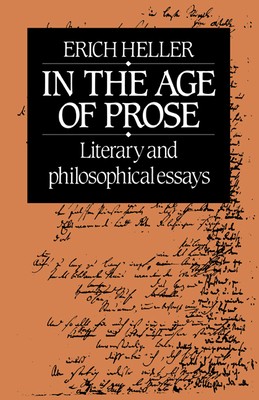
- We will send in 10–14 business days.
- Author: Erich Heller
- Publisher: Cambridge University Press
- ISBN-10: 0521274958
- ISBN-13: 9780521274951
- Format: 14 x 21.6 x 1.6 cm, softcover
- Language: English
- SAVE -10% with code: EXTRA
Reviews
Description
The guiding theme of these essays is the fate of the imagination and the condition of art in the modern world, where both appear to be enfeebled by scientific hubris, undermined by psychological self-questioning and compromised by political disaster. Erich Heller traces this predicament with subtlety and profundity, from Hegel's and Nietzsche's diagnoses to the various truces and manoeuvres through which remarkable victories have nonetheless been achieved - such as the comic triumphs of Wilhelm Busch. As elsewhere in Professor Heller's work, Thomas Mann's attempt to outwit and redeem his circumstances through art - 'despite' them, as he said himself - occupies a central place. Three of the present essays are devoted to him. Others consider Kleist, Fontane, Hamsun, Karl Kraus and the crucial figures of Hölderlin (who plays such a central role in Heidegger's later philosophical writings) and Rilke. Written with feeling, and the distinctive elegance and wit that have characterized all of Professor Heller's work, the essays here reaffirm the vital interdependence of literature and human values.
EXTRA 10 % discount with code: EXTRA
The promotion ends in 18d.20:34:05
The discount code is valid when purchasing from 10 €. Discounts do not stack.
- Author: Erich Heller
- Publisher: Cambridge University Press
- ISBN-10: 0521274958
- ISBN-13: 9780521274951
- Format: 14 x 21.6 x 1.6 cm, softcover
- Language: English English
The guiding theme of these essays is the fate of the imagination and the condition of art in the modern world, where both appear to be enfeebled by scientific hubris, undermined by psychological self-questioning and compromised by political disaster. Erich Heller traces this predicament with subtlety and profundity, from Hegel's and Nietzsche's diagnoses to the various truces and manoeuvres through which remarkable victories have nonetheless been achieved - such as the comic triumphs of Wilhelm Busch. As elsewhere in Professor Heller's work, Thomas Mann's attempt to outwit and redeem his circumstances through art - 'despite' them, as he said himself - occupies a central place. Three of the present essays are devoted to him. Others consider Kleist, Fontane, Hamsun, Karl Kraus and the crucial figures of Hölderlin (who plays such a central role in Heidegger's later philosophical writings) and Rilke. Written with feeling, and the distinctive elegance and wit that have characterized all of Professor Heller's work, the essays here reaffirm the vital interdependence of literature and human values.


Reviews